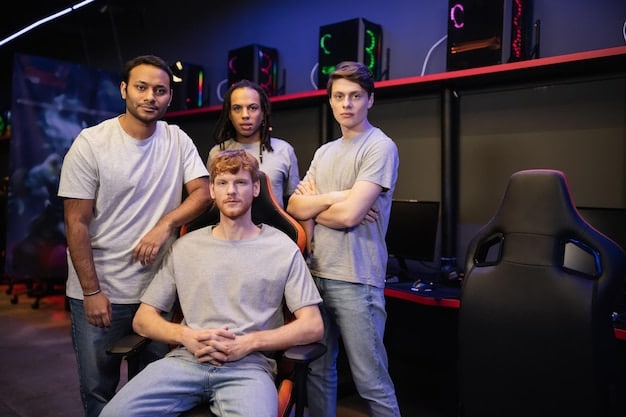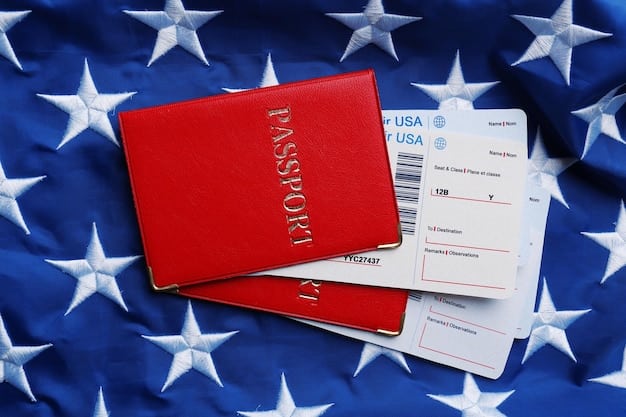Esports Visa Restrictions: Impact on Player Participation in 2025

Esports visa restrictions, particularly those stemming from evolving US immigration policies, significantly impact international player participation by creating barriers related to travel, work authorization, and overall accessibility to competitions and opportunities in the United States in 2025.
The world of esports thrives on global collaboration. However, evolving US immigration policies are presenting new challenges to international players seeking to compete in the United States. Understanding the impact of these esports visa restrictions: How New US Immigration Policies are Impacting International Player Participation in 2025 is crucial for players, teams, and the esports industry as a whole.
Understanding US Visa Options for Esports Players
The complex landscape of US immigration law offers a few potential visa options for esports players. Navigating this system effectively is essential for ensuring that international talent can participate in American tournaments and leagues. Let’s break down the main categories and their relevance to esports.
The primary visa options for esports professionals include the P-1A visa for internationally recognized athletes, the B-1 visa for business visitors, and, in some cases, the O-1 visa for individuals with extraordinary ability. Each visa has specific requirements and limitations. Choosing the right one depends heavily on the player’s career status and the nature of their participation in the US.
P-1A Visa: Internationally Recognized Athletes
The P-1A visa is designed for athletes who compete at an internationally recognized level. This visa could be applicable to esports players who have achieved significant success in major international tournaments and leagues. However, obtaining a P-1A visa can be challenging, as it requires demonstrating a high level of achievement and recognition.
B-1 Visa: Business Visitors
The B-1 visa is intended for individuals traveling to the US for business-related activities, such as attending meetings, conferences, or negotiating contracts. For esports players, the B-1 visa might be an option for short-term participation in events or tournaments that do not involve direct employment or payment from a US-based organization. Its suitability often depends on the specific nature of the esports activity.

Obtaining the correct visa isn’t just paperwork; it’s a gateway to opportunity and recognition for many players. Successfully navigating this process can mean the difference between competing on a global stage and being sidelined due to administrative hurdles.
Key considerations when evaluating visa options:
- Duration of Stay: How long will the player need to stay in the US?
- Nature of Activity: What type of esports activity will the player be involved in?
- Compensation: Will the player receive payment from a US-based organization?
Securing the correct visa involves more than just completing forms. It also involves gathering substantial evidence to support the player’s eligibility, a process that can be complex and time-consuming. Understanding these options and their requirements is vital for esports players aiming to compete in the US.
In conclusion, understanding the nuances of each visa option is a critical first step for any international esports player looking to participate in US-based competitions. Making an informed decision ensures compliance with US immigration laws and maximizes the chances of visa approval.
The Increasing Scrutiny of US Immigration Policies
In recent years, US immigration policies have faced increasing scrutiny, impacting various sectors, including the esports industry. Heightened security concerns and evolving political landscapes have led to stricter enforcement and more rigorous application processes for visas. These changes pose new challenges for international esports players seeking to compete in the United States.
The tightening of immigration policies is reflected in longer processing times, increased documentation requirements, and a higher rate of visa denials. These changes affect not only individual players but also esports teams and organizations that rely on international talent. The uncertainty surrounding visa approvals can disrupt schedules, impact team performance, and ultimately affect the overall competitiveness of the US esports scene.
Impact on Processing Times
Longer visa processing times can create significant delays for esports players, preventing them from participating in crucial tournaments and leagues. The unpredictability of the timeline makes it difficult for teams to plan their rosters and strategies effectively.
Increased Documentation Requirements
The need for more extensive documentation adds complexity to the visa application process. Players must gather and submit a wide range of evidence to support their eligibility, including proof of achievements, letters of recommendation, and detailed information about their esports career.

These heightened scrutiny levels require applicants to be more diligent and thorough in their preparations. Players and organizations need to invest additional resources into ensuring that all documentation is accurate and complete to avoid potential delays or denials.
Key factors contributing to increased scrutiny:
- National Security Concerns: Heightened awareness of potential security threats.
- Political Climate: Shifting immigration policies and priorities.
- Regulatory Changes: New rules and procedures implemented by US immigration authorities.
Esports organizations and players must stay informed about the latest developments in US immigration policies and adapt their strategies accordingly. Proactive planning and preparation are essential for navigating the evolving landscape and mitigating the potential impact of increased scrutiny.
In summary, the increasing scrutiny of US immigration policies presents significant challenges for international esports players. Understanding these challenges and taking proactive steps to address them is crucial for ensuring continued participation in the US esports scene.
How Visa Restrictions Affect Esports Tournaments and Leagues
Visa restrictions can have a direct and significant impact on the success and competitiveness of esports tournaments and leagues in the United States. When international players face difficulties obtaining visas, it can lead to reduced participation, lower quality of competition, and diminished audience engagement. These challenges can undermine the integrity and appeal of the US esports scene on a global scale.
The absence of key international players can alter the dynamics of esports tournaments, affecting team strategies and overall performance. If top-tier talent is unable to compete, it can reduce the perceived value of the competition and discourage spectators, sponsors, and media partners.
Reduced Player Participation
Visa restrictions can prevent talented players from participating in key tournaments, depriving teams of valuable assets and disrupting carefully planned rosters. When a significant number of international players are affected, it can impact the diversity and competitiveness of the entire event.
Decreased Competitive Quality
The quality of esports competitions depends heavily on the participation of top-tier talent from around the world. Visa restrictions can limit the pool of available players, resulting in a less competitive and less entertaining experience for viewers.
Possible consequences include:
- Lower Viewership: Reduced interest from fans due to diminished competition.
- Decreased Sponsorship: Less investment from sponsors concerned about the event’s appeal.
- Damage to Reputation: Negative impact on the event’s credibility and prestige.
The long-term effects of these challenges can be substantial, potentially leading to a decline in the overall health and growth of the US esports ecosystem. Maintaining an open and inclusive environment for international players is essential for fostering a vibrant and competitive esports scene.
In conclusion, visa restrictions pose a serious threat to the vitality and competitiveness of esports tournaments and leagues in the United States. Addressing these challenges requires proactive collaboration between esports organizations, immigration authorities, and government agencies.
Strategies for Esports Organizations to Navigate Visa Challenges
Esports organizations can adopt several strategies to mitigate the impact of visa restrictions and ensure that international players can participate in US-based competitions. Proactive planning, early application submissions, and robust documentation are essential steps. Building relationships with immigration attorneys and government agencies can also provide valuable support and guidance.
A key strategy is to begin the visa application process well in advance of planned events. This allows ample time to address potential issues and respond to requests for additional information. Another important step is to ensure that all documentation is accurate, complete, and properly organized to avoid delays or denials.
Proactive Planning and Early Submissions
Starting the visa application process early allows organizations to address potential issues proactively and ensure that players have sufficient time to obtain the necessary documentation. Early submission can also help to mitigate the impact of processing delays.
Detailed and Accurate Documentation
Submitting a comprehensive and accurate visa application package is essential for demonstrating a player’s eligibility. This includes providing proof of achievements, letters of recommendation, and detailed information about their esports career.
Key strategies for esports organizations:
- Consult with Immigration Attorneys: Seek expert advice on visa options and requirements.
- Build Relationships with Government Agencies: Establish communication channels with relevant authorities.
- Provide Comprehensive Support to Players: Assist players with gathering documentation and completing application forms.
By implementing these strategies, esports organizations can navigate the complexities of US immigration policies more effectively and ensure that international players have the opportunity to compete in US-based tournaments and leagues. These proactive measures can help to maintain the competitiveness and appeal of the US esports scene on a global scale.
In conclusion, esports organizations must take a proactive and strategic approach to managing visa challenges. By investing in expert guidance, implementing robust documentation processes, and building strong relationships with government agencies, organizations can minimize disruptions and ensure that international players can participate in US-based competitions.
The Role of Esports Federations and Associations
Esports federations and associations play a crucial role in advocating for policies that support international player participation. These organizations can work with government agencies and immigration authorities to raise awareness of the unique challenges faced by esports players and promote solutions that facilitate visa approvals. By serving as a collective voice for the esports community, federations and associations can help to shape a more inclusive and supportive environment.
One of the key roles of esports federations and associations is to educate policymakers about the economic and cultural benefits of esports. By highlighting the positive impact of the industry, these organizations can build support for policies that encourage international participation. They can also work to establish clear guidelines and standards for esports visas, reducing the ambiguity and uncertainty that can complicate the application process.
Advocating for Policy Changes
Esports federations and associations can advocate for changes to immigration policies that would streamline the visa application process for esports players. This includes lobbying for the recognition of esports as a legitimate sport and working to create a specific visa category for professional gamers.
Providing Resources and Support
These organizations can also provide resources and support to esports players and organizations navigating the visa application process. This includes offering guidance on documentation requirements, providing access to legal experts, and organizing workshops and training sessions.
Key responsibilities of esports federations and associations:
- Lobbying Government Agencies: Influencing policymakers to adopt esports-friendly immigration policies.
- Educating the Public: Raising awareness of the economic and cultural benefits of esports.
- Establishing Industry Standards: Developing clear guidelines for esports visas and player eligibility.
Esports federations and associations are essential for creating a supportive and inclusive environment for international players. Through advocacy, education, and resource provision, these organizations can help to ensure that talented gamers from around the world have the opportunity to compete in US-based tournaments and leagues.
In conclusion, esports federations and associations play a vital role in shaping immigration policies and promoting international player participation. By working collaboratively with government agencies and industry stakeholders, these organizations can help to build a more vibrant and competitive esports scene in the United States.
Future Outlook: Adapting to Changing Immigration Policies in 2025
Looking ahead to 2025, the esports industry must continue to adapt to evolving US immigration policies. This requires ongoing collaboration between esports organizations, federations, and government agencies to address emerging challenges and develop proactive solutions. Investing in education, advocacy, and strategic planning will be essential for ensuring that international players can continue to participate in US-based competitions.
One of the key strategies for adapting to changing immigration policies is to diversify recruitment efforts. Esports organizations can look beyond traditional talent pools and explore new regions and countries for potential players. This can help to mitigate the impact of visa restrictions while also fostering a more diverse and inclusive esports community.
Investing in Education and Training
Esports organizations can invest in education and training programs to help international players understand US immigration policies and navigate the visa application process more effectively. This includes providing access to legal experts, offering workshops and seminars, and creating resources that explain visa requirements in clear and simple terms.
Promoting Advocacy and Awareness
Esports federations and associations can continue to advocate for policy changes that support international player participation. This includes working to raise awareness of the economic and cultural benefits of esports and lobbying for the recognition of esports as a legitimate sport.
Key steps for adapting to changing immigration policies:
- Diversify Recruitment Efforts: Explore new regions and countries for potential players.
- Strengthen Relationships with Government Agencies: Build strong communication channels with relevant authorities.
- Develop Flexible Roster Strategies: Prepare for potential visa denials by maintaining backup players.
The future of esports in the United States depends on the ability of the industry to adapt to changing immigration policies. By investing in education, advocacy, and strategic planning, esports organizations and federations can help to ensure that international players can continue to compete in US-based tournaments and leagues, fostering a vibrant and competitive esports scene.
In conclusion, adapting to changing immigration policies in 2025 requires a proactive and collaborative approach. By investing in education, advocacy, and strategic planning, the esports industry can overcome challenges and ensure that international players continue to contribute to the growth and success of the US esports scene.
| Key Aspect | Brief Description |
|---|---|
| 🛂 Visa Options | P-1A (athlete), B-1 (business visitor), and O-1 (extraordinary ability). |
| 🔒 Increased Scrutiny | Stricter enforcement leading to longer processing times and higher denial rates. |
| 🏆 Tournament Impact | Reduced player participation can diminish the quality and appeal of events. |
| 🤝 Federation Role | Advocating for policy changes and providing resources to players and organizations. |
Frequently Asked Questions
▼
The P-1A visa is for internationally recognized athletes, potentially applicable to esports players with significant achievements. It requires demonstrating a high level of recognition and success in major tournaments.
▼
Visa restrictions can reduce international player participation, lower competition quality, and diminish audience engagement, impacting the overall success and appeal of US esports tournaments.
▼
Proactive planning, early application submissions, detailed documentation, and consulting with immigration attorneys are key strategies for navigating visa challenges effectively.
▼
Esports federations advocate for policy changes, educate policymakers, and provide resources to support international player participation, fostering a more inclusive environment.
▼
Diversifying recruitment, investing in education and training, and promoting advocacy and awareness are essential for adapting to evolving US immigration policies in 2025 and beyond.
Conclusion
The intersection of esports and US immigration policies presents a complex challenge that demands proactive solutions. Ensuring that international players can continue to compete in the United States requires collaboration, strategic planning, and a deep understanding of the evolving legal landscape. By embracing these strategies, the esports industry can pave the way for a more inclusive and competitive future.